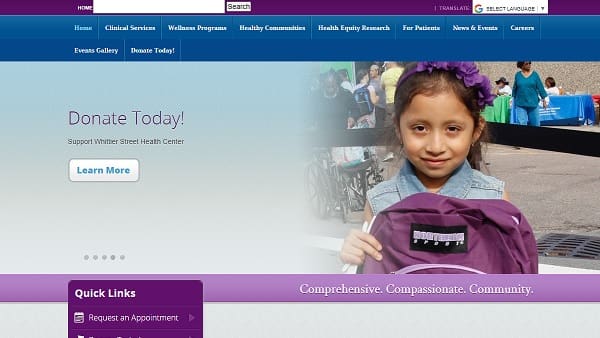
Whittier Street Health Center, a community health center with a mission to serve as a center of excellence that provides high quality and accessible health care and social services that achieve health equity, social justice, and the economic well-being of a diverse patient population, recently shined a light on the importance of Black Maternal Health Week.
Founded and led by the Black Mamas Matter Alliance, Black Maternal Health Week is observed each year from April 11-17 to bring attention to and promote action in improving Black maternal health.
According to the Centers for Disease Control and Prevention (CDC), Black women are three times more likely to die from a pregnancy-related cause than White women, with multiple factors contributing to the disparity, including access to quality healthcare, underlying chronic conditions, and bias.
The national week of awareness and activism is intended to deepen the conversation about Black maternal health in this country; amplify community driven policy, research, and care solutions; and enhance community organizing on Black maternal health.
“Health disparities in maternal mortality and pregnancy-related outcomes persist for Black women. Additionally, recent data from the CDC’s Maternal Mortality Review Committees (MMRCs) reflect that cardiac and coronary conditions remain leading causes of pregnancy-related deaths for non-Hispanic Black women,” said Dr. Adrienne Headley, Director of Obstetrics and Women’s Health, Whittier Street Health Center. “While programs on the national, local, and community levels exist, increased awareness and advocacy remain crucial to eliminate health disparities and improve Black maternal health.”
Whittier offers a full range of obstetric and gynecological services. It also supports women’s holistic health with the CenteringPregnancy program, a model of group care that integrates health assessment, education, and support into a unified program within a group setting where eight to twelve women with similar gestational ages meet, learn care skills, participate in facilitated discussions, and develop a support network with other group members.
“Pregnant women and their families, health care providers, hospitals, healthcare systems, states, and communities must all work together to reduce Black maternal mortality,” said Frederica M. Williams, president and CEO of Whittier Street Health Center.
About Whittier Street Health Center
Whittier Street Health Center is an independently licensed community health care center with a mission of providing high quality, reliable and accessible primary healthcare for diverse populations while promoting wellness and eliminating health and social disparities. A champion of equitable access to high quality, patient-focused care, social justice and economic equity, Whittier Street Health Center is accredited by The Joint Commission (TJC), certified by the National Committee for Quality Assurance (NCQA) as a Patient-Centered Medical Home, and recognized by the NCQA for its Behavioral Health Integration. Through its locations in Roxbury and North Dorchester, and its Mobile Health Van program, Whittier Street Health Center serves more than 30,000 patients and 20,000 community outreach visits annually; its ethnically and racially diverse patient base is primarily made up of individuals from Roxbury, Dorchester, Jamaica Plain, the South End and greater Boston. Approximately 28% of Whittier’s patients are uninsured. Whittier Street Health Center provides a comprehensive array of 40 healthcare programs and services designed to meet the primary health care, behavioral health, and social needs of the community. For more information, please visit www.wshc.org as well as Facebook (www.facebook.com/WhittierStreetHealthCenter), Twitter (@Whittier_Boston), or LinkedIn (https://www.linkedin.com/company/whittier-street-health-center), or call 617-989-3221.









